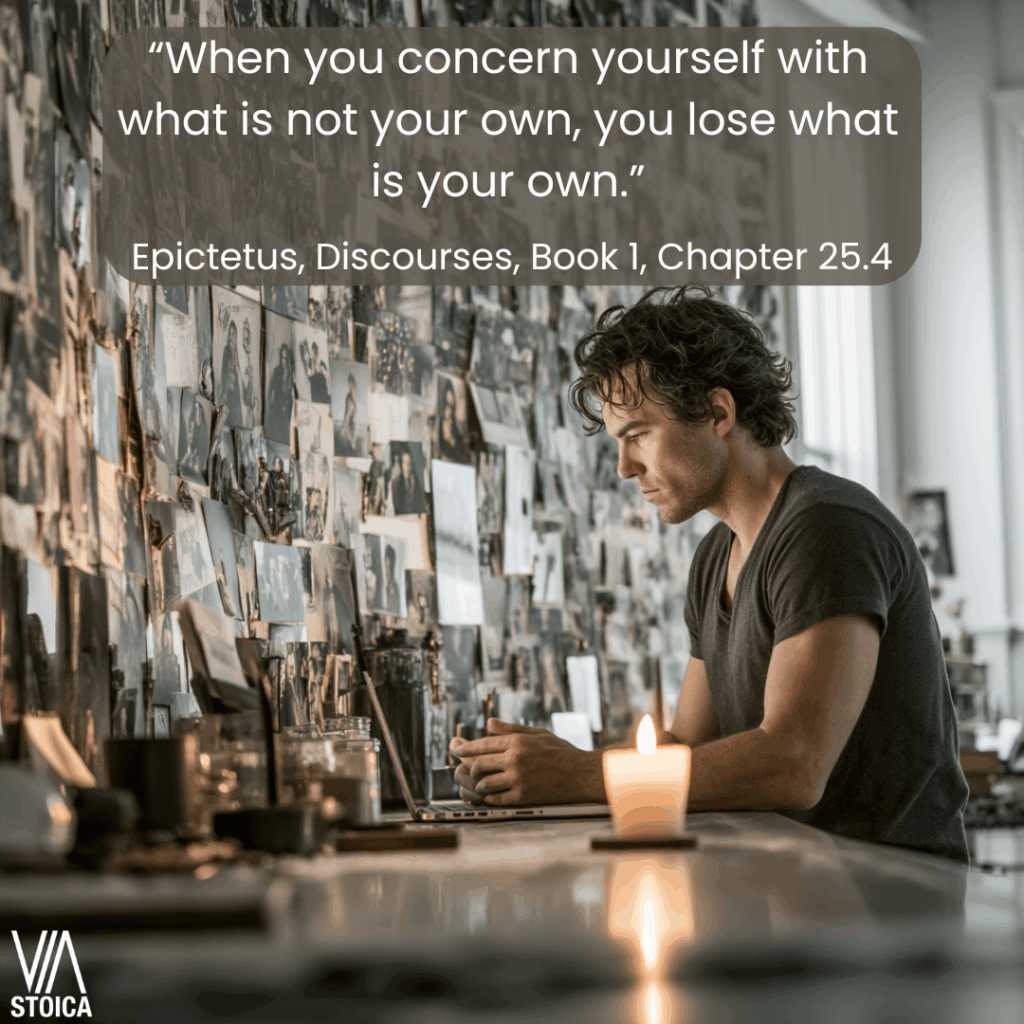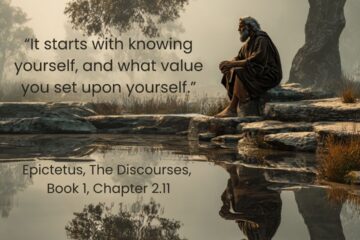
We live in a world that is all about control and trying to have power over the uncontrollable. But what if true power lies not in controlling others, but in mastering ourselves? That’s why these 10 Epictetus quotes on self-mastery are key to living a more peaceful life.
Epictetus’ teaching on being your own master has withstood the test of time. A former slave turned philosopher, he taught that peace isn’t found in bending the world to our will, but in choosing how we respond, think, and live. Self-mastery is the Stoic’s path to freedom.
In this post, we explore 10 quotes from Epictetus that highlight the Stoic view of self-mastery and offer practical ways to practice it daily.
Section I: Know What’s Yours
1. Freedom Starts with Knowing What You Control
“Some things are up to us and some are not.”
Epictetus, Handbook, 1
This is the foundation of Stoic self-mastery. Epictetus divides life into two parts: what’s within our power (thoughts, actions, reactions) and what we cannot control (others, outcomes, the past, our bodies).
Practice: Start each morning by writing down one thing you can control and one thing you can’t. Let go of the latter.
2. You Always Own Your Response
“It is not the things themselves that disturb people but their judgements about those things.”
Epictetus, Handbook, 5
Events happen, but our suffering begins with judgment. By managing our impressions and opinions, we reclaim agency, even in chaos. We then become true masters of how we view the world around us.
Practice: Pause before reacting. Ask: “What am I adding to this situation with my thoughts?”
3. Master Yourself, Not the World
“Do not ask things to happen as you wish, but wish them to happen as they do happen, and your life will go smoothly.”
Epictetus Handbook, 8
Self-mastery means going with reality instead of fighting against it. It’s not passivity, it’s disciplined acceptance and wise action.
Practice: When frustrated, say aloud: “Let me align with what is.”
Section II: Let Go of What Isn’t Yours
4. The Progression of Blame
“It is the action of an uneducated person to lay the blame for his own bad condition upon others; of one who has made a start on his education to lay the blame on himself; and of one who is fully educated, to blame neither others nor himself.”
Epictetus, Handbook, 5
Epictetus outlines a path of personal growth: from blaming others, to self-accountability, to freedom from blame altogether. It’s not an easy journey, but with the proper education and practice, it is available for all of us.
Practice: When faced with a setback, pause and reflect: “Am I assigning blame, or am I focusing on how I can respond constructively?”
5. Focus Inward, Not Outward
“When you concern yourself with what is not your own, you lose what is your own.”
Epictetus, Discourses, Book 1, Chapter 25.4
When we chase opinions, outcomes, or approval, in short, things that don’t belong to us, we give away our power. Self-mastery begins with reclaiming your attention and focusing on yourself.
Practice: Spend one day noticing when your mind drifts to things beyond your control. Gently bring your attention back to what’s yours: your thoughts, choices, and values. Notice how often you seek approval.
6. You Are Not Your Body or Possessions
“In our power are choice, and all actions dependent on choice; not in our power, the body, the parts of the body, property, parents, brothers, children, country, and in short, all with whom we associate.”
Epictetus, Discourses, Book 1, Chapter 22.10
Self-mastery requires knowing where your domain ends. Care for externals, but don’t let them own you. What you always control is your ability to choose.
Practice: When facing loss or uncertainty, remind yourself: “My choices are mine, the rest is not.”
Section III: Practice Inner Discipline
7. Choose Your Thoughts Carefully
“If someone handed over your body to any one he met along he way, you would be angry. But are you not ashamed that you hand over your judgment to anyone who happens to come along, so that, if he abuses you, it is disturbed and confused?”
Epictetus, Handbook, 28
Your thoughts shape the world around you. That’s why mental discipline is at the core of self-mastery. Guard your thoughts as you would guard your body, because what you think shapes who you are.
Practice: For one hour, observe your thoughts. Ask: Are these mine, or borrowed?
8. Prepare for What Might Go Wrong
“When you are about to undertake some action, remind yourself what sort of action it is.”
Epictetus, Handbook, 4
Anticipating difficulty strengthens your calm. Mastery doesn’t mean avoiding pain; it means preparing to meet it with courage and clarity. Preparing yourself for possible outcomes will give you an edge and will increase your confidence. The Stoics called this negative visualization.
Practice: Before each task, ask: “What could go wrong — and how will I respond?”
9. Don’t Be Ruled by Emotion
“No man is free who is not master of himself.”
Epictetus, Fragments, 35
Freedom is not indulgence, it’s self-command. Anger, fear, envy: these overpower us unless we tame them through practice and reason. Don’t become a slave of your emotions or desires.
Practice: When emotions flare, breathe deeply. Name what you feel without acting on it.
10. Your Mind Is Your Kingdom
“You can be invincible if you enter into no contest in which it is not in your power to conquer.”
Epictetus, Handbook, 19
Choose your battles wisely. When we stop engaging in things beyond our power, we begin to rule over ourselves and find peace.
Practice: Before reacting or engaging, ask: “Is this mine to control?” If not, step back. Repeat it when overwhelmed.
Final Reflection
The teachings of Epictetus remind us that self-mastery isn’t about suppression; it’s about agency. The moment we stop outsourcing our peace and start choosing our inner responses, we begin to live like Stoics.
Journaling Prompt: Where in your life do you feel pulled away from yourself? What would it look like to return to what is yours?
Book a free consultation with one of our Stoic Coaches to get support. Or read more quotes on our Epictetus Quotes page. Listen to the Via Stoica Podcast on Spotify, Apple Podcasts, or YouTube.


0 Comments